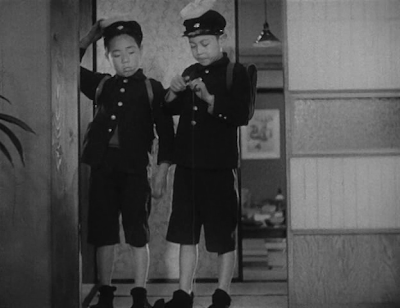Almost didactic, I Was Born, But ... is another display of Ozu's extraordinary stylistic rigor. And of his fine sense of humor. By paralleling two boys' rise to power in a neighborhood gang and their father's subordination at work, Ozu lays bare two sets of power structures and examines how they tie into each other. The Yoshii family move to a suburb. The boys get into trouble with local bullies and fight with their father's boss son. Fearing retribution, they skip school. Finally, with the help of an older delivery boy, they defeat the main bully and assert their new power. Meanwhile, we get several scenes in which the father is shown as an apple-polisher, who moved to the suburbs in order to be near to his boss, who slaves away in order to advance his essentially meaningless career and who is being laughed at by his co-workers. In this context, status is key. The boys take great pride in their fathers' social position and demand from the others to recognize that their father is the best. But at a private screening at the boss' house, they witness how their father is willing to make a fool of himself in order to entertain the boss.
What at a younger age is achieved through force and power, in later years equals to subordination. But this rather bland assertion is aggremented by Ozu's critique of social streamlining. In what is one the most famous sequences in the film, a tracking shot of school students marching in front of the school building is followed by a tracking shot of office workers yawning. Society, Ozu tells us, takes a bustling human capital and molds them into a bunch of lemming-like worker bees who don't begin to realize their potential, instead following meaningless social conventions. What good is social status, then?
Another interesting thing is that Ozu makes it very clear that social power is deterministic, whereas the boys determine power by force or brains. In the grown-up world, the boss is the boss. There is nothing more to it. He is not the smartest, not the biggest, not the strongest, he just is. People catering to him simply come from this fact. Status in the boys' world however is constantly negotiated, which makes more sense, and it is all the more devastating for the boys to see how their father must behave in order to get some form of social power. And even then, he is ridiculed by his co-workers, which renders void whatever social power he might have.
Expertly shot and very funny, I Was Born, But ... is another outstanding offering from Ozu. And yet again, the myth that he was a big defender of Japanese tradition makes no real sense here. In my mind, for what it's worth, he critiques social conventions quiet sharply. Although I have to admit that the lofty happy-endingesque closing moments of the film reached for generational and family unity where Ozu could have been a little more critical. Which doesn't diminish the overall quality of the film.
I must remember this
7 hours ago






0 comments:
Post a Comment